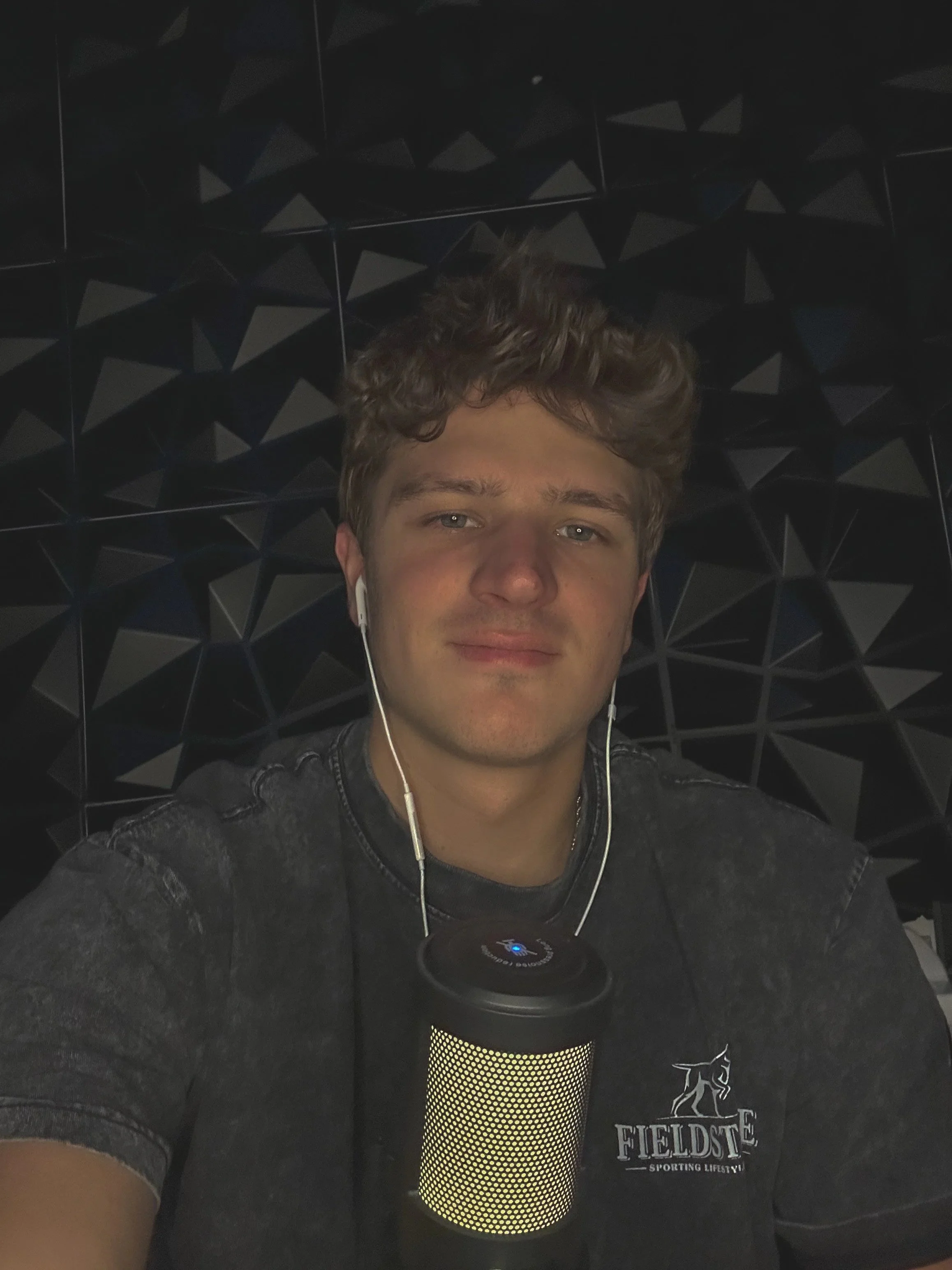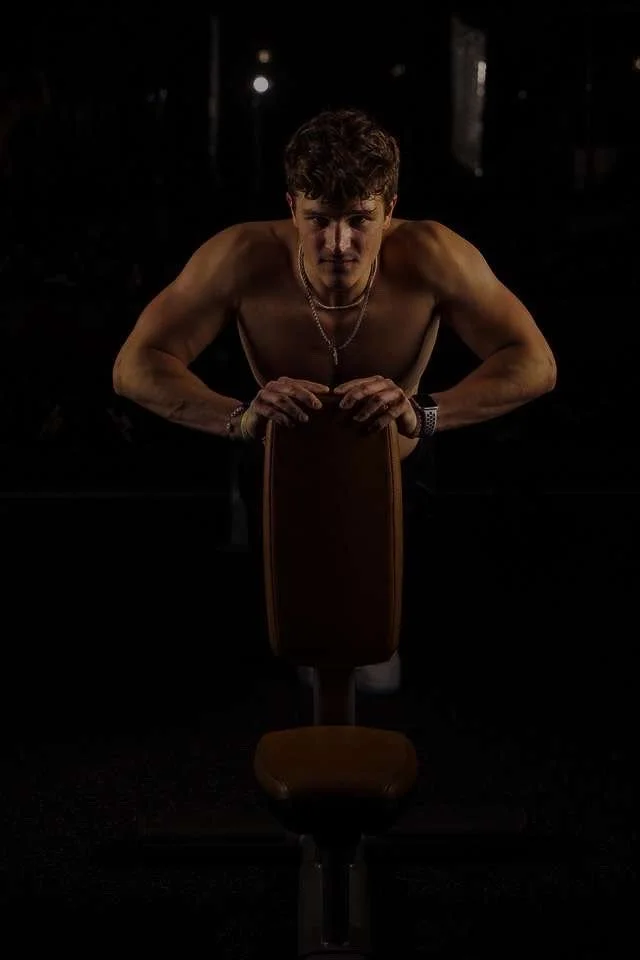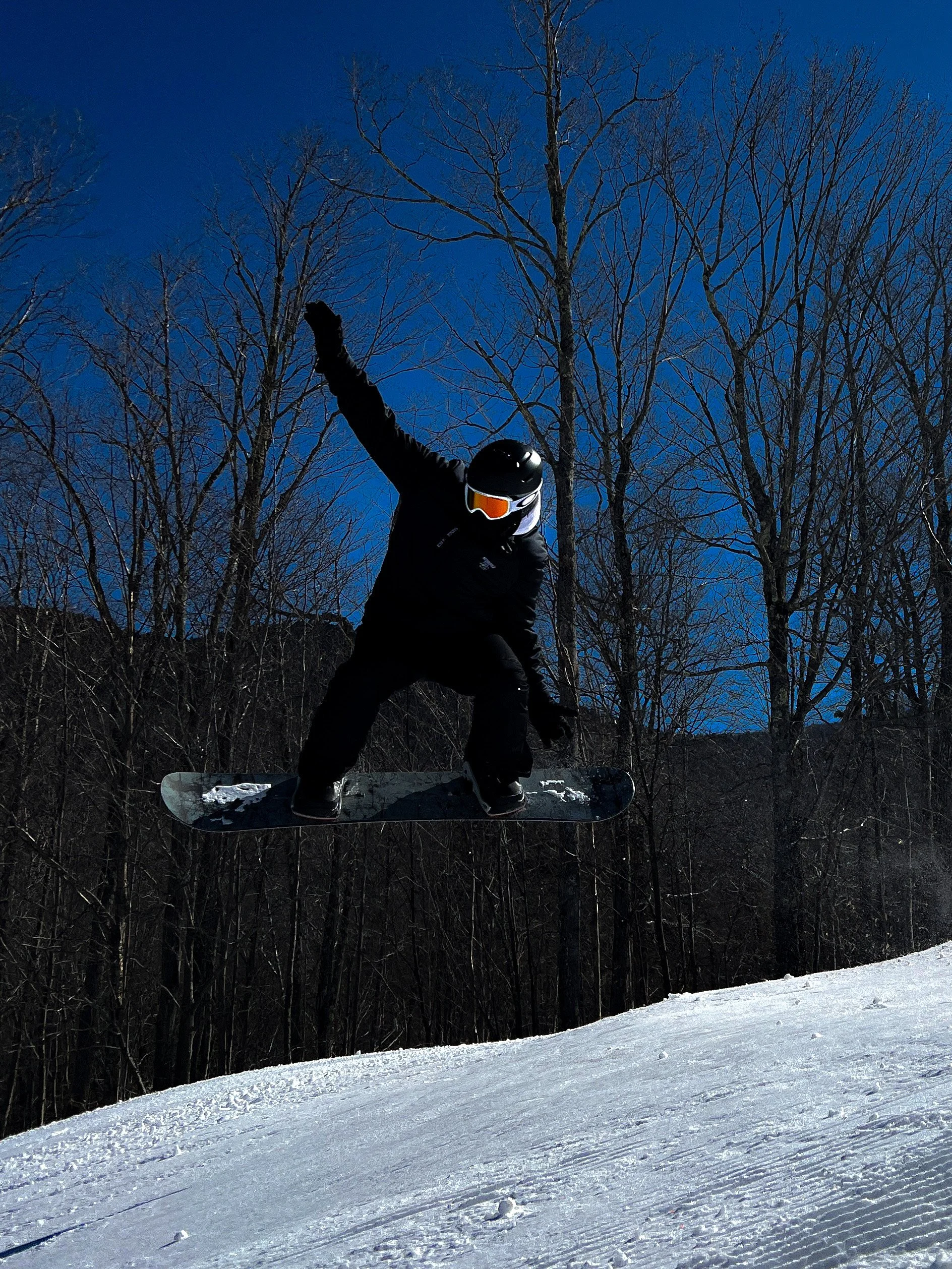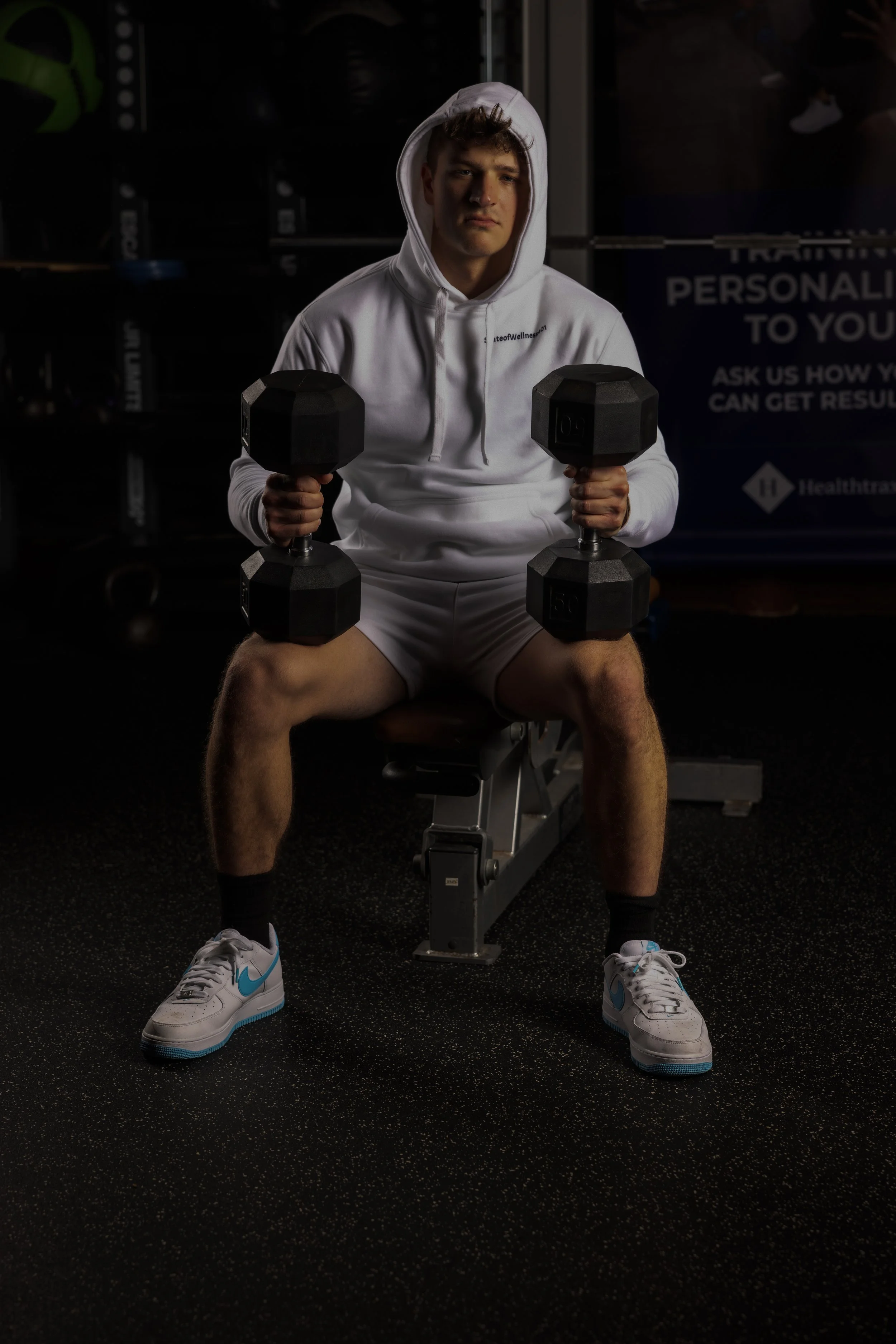Sports podcaster goes beyond the game
Michael Couture interviews professional athletes. Photos submitted
By Tom Victoria
Michael Couture finds out how pro athletes stay healthy in more than just body. He interviews them about maintaining their mental health.
The podcaster explained why he took this approach.
“I want to be different than a lot of people,” he said. “There's many people out there now doing sports podcasts. You have to be different or it's not going to go anywhere in a way. In this journey with mental health in grad school, I've always thought about: how can I help people? That's been my journey throughout my entire life, helping people.”
Michael, 23, decided to ask athletes how they deal with the mental aspect of sports.
“When I started this, I wanted to know the struggles that these players go through,” he said. “When I played sports, mental health was never a thing in my mind. I didn't think about it. Was I sad, depressed? Some days, but I never thought about it. So I wanted to start this to hear these people's stories.”
Michael, whose show is Beyond the Game, has interviewed guys in the highest profile sport.
“I did a guy named Alec Anderson (of the Buffalo Bills) who was having panic attacks his whole life,” he said. “Even in the NFL, he was having panic attacks, not playing because he was going through so much. For some kid to hear that story and resonate with that and be able to talk to someone at a younger age now is what I hopefully get out of it.”
Michael said Alec was glad to share his background.
“He's like, I want people to hear my story,” he said. “And he was telling me how he has two other people that he's going to be talking to — they have their own podcasts and stories that they do. He told me he was going to do them also because he wants people to hear their story, that so many people that are going through it aren't left alone, that a professional athlete who everyone thinks is going through nothing because he's playing in the NFL, has all the money in the world, but deep down he's going through so many struggles.”
Michael covered a major source of anxiety for football players.
“One of them said about the cuts,” he said. “There's that pressure to it where there's 100 guys on the team, only 50 make it and try out. When I did Alec, he was saying his panic attacks were so high during that period of time. He would see the therapist every single day because everything that was going on, he didn't want to get cut. He wanted to play his best, but he couldn't because he was having all these panic attacks. It was messing up his game.”
Michael recalled how he started the podcast.
“I was doing online fitness coaching for a while, but that wasn't my passion,” he said. “Right now, I'm in grad school starting to become a mental health therapist. Want to specialize with kids with trauma and everything like that. I was at work one day at Orangetheory Fitness, and I met this girl who started a podcast and she was telling me how I should do a podcast about mental health and sports.”
Michael initially thought it would be extremely difficult talking to any pros.
“I started reaching out to people on Instagram, all these NFL players, and was thinking: no one's going to email, message me back,” he said. “They're all NFL players. They have their own lives. I'm just a random guy from Rhode Island. I started reaching out to people, and I got one guy, my first guy, Cade York. And after that, it kept me going on and on and reaching out to people.”
Michael, who also spoke to Brad Robbins (punter for the Bills) and former Los Angeles Charger Geremy Davis as well as bobsledders Elliot Markuson and Emily Renna, reaches out to different franchises.
“Every day, I usually DM a team and probably one to two people get back to me,” he said. “I talk to them about mental health and the struggles they've gone through throughout their lives, throughout the sport that they love and play and everything that goes on with that. I would like to have a story out there for kids that might be listening, that play sports. A lot of kids that play sports don't know what's really going on in their head or even think anything of it.”
Michael employs social media to contact athletes.
“I usually DM them on Instagram,” he said. “I have this message about what I do with my podcast, how I started it, why I started it, what I hope to get out of it, and how they would be a great inspiration. I research them and see what their stories were back then, because everything's online now. I make a whole list of questions to ask them whenever we do the interview. Sometimes, I reach out to their agents.”
Michael was pleasantly surprised by how receptive some players are to being interviewed on the topic.
“I didn't think any of these guys would message me,” he said. “Even as I go through teams and reach out to them, I'm still like, which one's going to say yes to me? Maybe none of them will. I reached out to the Baltimore Ravens and none of them got back to me. It's 50/50 if they do or not. It's really cool because when they did reach out to me, I got their numbers. And we continue to text even to this day. I've done them two months ago and we still could stay in contact. So it's really cool.”
Michael stays active in his free time.
Michael didn’t expect the athletes to be so open about their lives.
“A lot of them talked to me about their faith, which I didn't think would matter to them in a way,” he said. “Their religions are religion, but in their sport that they play, they talked a lot about their faith and going on the field and praying before every play.”
Michael also was surprised by how accessible some of them are.
“Just messaging me back and also having these connections now,” he said. “I'm actually going to talk to one tonight. He reached out to me. He's like, hey, hope you're doing well. I would love to set up a phone call later with you. It's really cool that these guys that have a career right now, that are practicing in a facility right now, that really don't have much time because they're playing the sport that they love but still making time for a kid in Rhode Island. They all said they would send me jerseys. It's really cool having these connections and we never expected that to happen.”
Michael intends to tackle other sports.
“I'm reaching out to everyone,” he said. “I just started with NFL players. I've messaged NHL players. I messaged college hockey players. I reached out to Providence College on the soccer team and one of the girls there that plays soccer wants to do it. I'm trying to get anyone that plays a sport that they love and want to talk to me about it.”
Michael wasn’t always the type of person who could approach pro athletes for interviews.
“Growing up, I had very low self-esteem and talking to people was very hard for me,” he said. “Then when I got to college, that's when I began doing psychology and a lot of these people that I was talking to, all my friends would always come to me for their problems. We'd go out in the football field and just keep talking and talking. It really was so easy being able to be like a therapist to them. It was more like a friend, but just be there for them.”
Michael still wouldn’t find it easy to approach strangers.
“If I just go up to a random person, it's hard for me to talk to them just about anything,” he said. “When I was talking to the first guy, I was so nervous about doing it. But as I was asking him the questions and listening to what he was saying, it was easy to hone in on it, go back into the conversation he was talking about. It's something that I know a lot about, it's something I'm passionate about, I want to learn about, I want to talk about. I love talking about it and I want to hear more about their stories.”
Michael started counseling people.
“I got my first client two weeks ago for therapy and I was so nervous,” he said. “But when I was in the room and he was just telling me his problems, everything just went away. I was just being me, being able to talk to him, help him, and it was just very natural.”
Michael will be presenting the athletes’ stories in another fashion down the road.
“I'm actually writing a book right now on every single person I've done on my podcast and their story,” he said.
Michael said the athletes encouraged him to pursue sports psychology as a career.
“Every single person I've done on my podcast has told me I should be a sports psychologist,” he said. “Growing up, I would never see myself doing this. Alec Anderson told me that they have a psychologist. Every game, every practice, she's there 24/7. I need to get my degree first. I graduate next May, but once I do, I'm going to start looking more into sports psychology because I think it's really fascinating. And doing this podcast really helps. Hearing these stories has given me a leg up to help me even do it if I wanted to.”
Michael said athletes and anyone else experiencing stress need to get it off their chests and spread the word.
“Just being able to talk about it,” he said. “When I tell people that I'm going to be a therapist, they're always like, they need more of that because out there there's not many therapists as people have problems. I would say having community groups. The therapist is going to be there. My goal is to have a community event in Rhode Island, raise some funds for it and have people come and talk to sports athletes. The biggest thing is everyone that's gone through something, just talk about it and share their story. If you watch a video on something, TikTok, Instagram or YouTube and you hear someone's story about what they've been through, that can change someone's life right there.”
Michael learned how depressed people express the need to have someone they can talk to about their problems.
“When I was doing my internship, we watched this video about this guy that was going to jump off a bridge,” he said. “He did, but he stayed alive. He said he wished there were people that would be there for him and know what he was going through because he really wouldn't talk about it. But there were signs that he was depressed and maybe gonna commit suicide. I wish schools would do a mental health class, do a suicide class where you figure out the signs about suicide and talk about mental health. I never knew about mental health till I was in college.”
Michael recalled the pro athlete who inspired him as a youth.
“I would say Tom Brady,” he said. “Just hearing his story and all the struggles he went through, being a sixth string quarterback and how he got his mental health right and got into being the starter quarterback.”
Michael also found inspiration closer to home, including one of his siblings.
“My whole life, I've grown up right under him, playing the same sport as him, following everything he's done in school, sports,” he said. “He's been my biggest hero, the person I look up to and go-to with my mental health. When I'm going through something, I'm always talking to him because he also is a therapist and he knows who I am as a person. He really changed my life.”
Michael also was inspired by a friend, Alex Dejordy, a previous Grid profile.
“For a long time, I was depressed, always worrying about girls and everything,” he said. “And I met Alex at the gym because we both worked there. He changed my life in so many ways with getting my body in the right shape that I wanted to and having a mindset where there's so much more to life than being sad and how to overcome that. And now, I don't really worry about the things I shouldn't worry about because I don't need to. I focus on a bigger purpose in life.”
Michael has a sports background.
“Played baseball as a kid, but mostly I played hockey and lacrosse growing up,” he said. “Played basketball in middle school, but lacrosse I played since I was a kid to high school. Played in college at the University of Rhode Island. I still play here and there, but now I just go outside and play by myself. Play tennis a couple times a day with my friends.”
Michael wants to continue the podcast upon finishing grad school and becoming a therapist.
“I do really want to continue this and sharing people's stories,” he said. “I don't get paid for doing this podcast. I do it in my free time because it's something I want to do and I want to hear these people's stories. I want to grow connections with these people, and I want kids to hear these stories. I'm definitely going to continue it once I graduate and keep writing books about it and keep doing as many people as I can for as long as I can.”
Michael stays motivated by doing what he’s passionate about.
“I want to get content out there for people to hear,” he said. “I also post me saying some inspirational things. I want to keep getting content out there. So I have to take time out of my day to say some inspirational things that I want people to hear. So I posted on everything just to get content out and also hopefully have people listen to it and hear these inspirational things, hopefully change their life in a way.”
Michael dispensed advice to those contemplating doing a podcast.
“Literally, just go for it,” he said. “I didn't know how to start. I didn't know what to do, so I started looking online, how to start a podcast, how to get it on YouTube, Spotify, everything like that. And then just comes up to what you want to talk about on the podcast. What's something about you that you want to share? What's your story? What's something inspirational to you and that you love talking about? You can reach out to anyone, friends. The first person I did was Alex. And as I kept doing my friends, it kept me going for more people and more people and more people and just going out there and doing it. When I started and I just went for it, I was like, wow, this is what I really want to do.”
Michael advised anyone struggling to find an ear.
“Talk to someone,” he said. “No matter what you're going through, even if you just had a bad day or something happened in your life, just getting it out there.”
Michael knows firsthand about dealing with adversity.
“Growing up, it was a lot of trauma that I had in my life and I was going through with my siblings,” he said. “That's the reason why we all became therapists. Me, my sister and my brother were from the childhood that we had and the raising that we got brought up in. My dad was an amazing person. My mom was a really hard person on us.”
Michael said those experiences led to his career path.
“That's why I got into college and wanted to become a therapist and why I started this podcast,” he said. “It's because of the trauma that I had and that's why I went to grad school and want to specialize with kids with trauma because that's my story that I dealt with growing up. That's a story that I want to share and help others with.”
Michael’s Instagram: https://www.instagram.com/beyondthegame401/
Michael’s YouTube channel: https://www.youtube.com/@BeyondTheGameMindandBody








